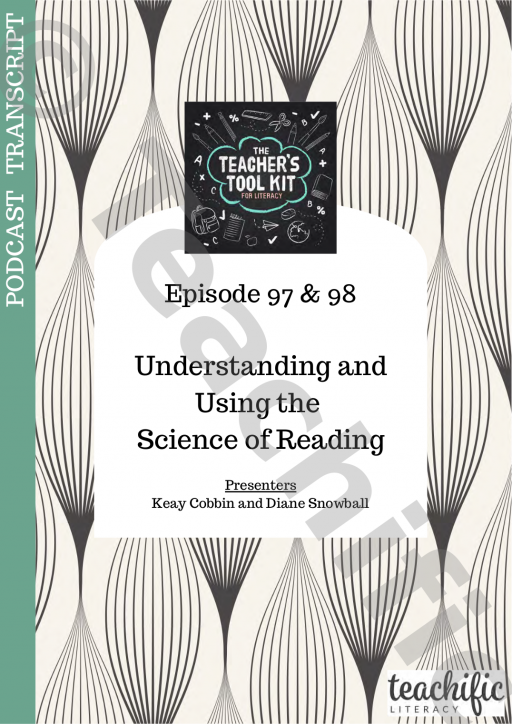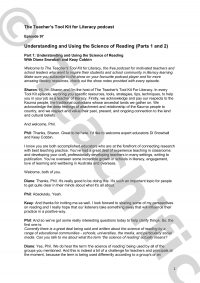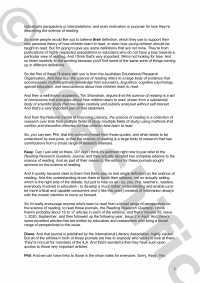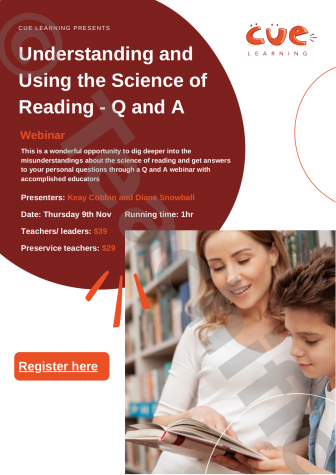About this teaching resource
In Part 1 of this podcast transcript Episode 97 & 98 Understanding and Using the Science of Reading, expert educators Diane Snowball and Keay Cobbin discuss the science of reading.
They emphasise that the science of reading is a term used by various educational communities and can have different interpretations. They provide definitions from reputable sources, highlighting that it encompasses multidisciplinary knowledge from educators, linguistics, cognitive psychology, special education, and neuroscience about how children learn to read.
They discuss common misconceptions, such as equating the science of reading with a specific phonics program, and the challenges this can create in education. They emphasise the importance of continually updating knowledge because the science of reading is always evolving.
The podcast also delves into different models of the reading process, including the Simple View of Reading, Scarborough's Reading Rope, and the Active View of Reading. These models are seen as valuable tools for understanding reading but are not a one-size-fits-all solution. The discussion highlights that teachers need strong content knowledge and pedagogical skills to apply these models effectively in the classroom.
Keay and Diane then discuss the importance of providing students with independent reading and writing time. They stress the need for explicit instruction during this time, ensuring that students understand how to apply what they learn in their own reading and writing.
They reference the National Reading Panel's five major components for successful reading: phonemic awareness, phonics, comprehension, vocabulary, and fluency. They highlight the significance of providing balance in a reading program that integrates systematic phonics instruction with other reading elements. Vocabulary instruction is discussed, with an emphasis on morphology and building vocabulary through reading. The evolving understanding of these components over time is acknowledged.
Overall, the podcast emphasises the importance of staying informed about the evolving science of reading and using this knowledge to inform teaching practices tailored to the needs of individual students.
In Part 2 of this podcast, Understanding and Using the Science of Reading, education experts Diane Snowball and Keay Cobbin discuss several important aspects of early reading education, including the significance of providing inviting and exciting reading materials in classrooms for young learners.
Diane emphasises the importance of offering books that make sense and are interesting for students, as opposed to overly decodable books with limited word patterns. She suggests allowing students to explore words and create sentences with specific word patterns to enhance both encoding and decoding skills.
Diane and Keay stress the importance of exposing children to excellent models of the English language from an early age, referencing classic children's books by authors such as Eric Carle, Mem Fox, Pat Hutchins, Pamela Allen, and Dr. Seuss. They argue that rich literature not only supports language development but also helps students learn to make inferences, predictions, and visualisations while reading.
The conversation also touches on the topic of comprehension instruction. Both experts advocate for teaching comprehension strategies from the beginning of a child's school journey, emphasising that comprehension instruction should start early to ensure that all students have access to it. They reject the idea that comprehension instruction should be delayed until a certain grade.
Additionally, Diane and Keay discuss the importance of motivation and engagement in reading, highlighting the significance of giving students choices in what they read. They stress that fostering a love of reading and ensuring students believe in their own reading abilities are critical for long-term engagement.
Diane and Keay emphasise the importance of teaching students a repertoire of strategies to enhance comprehension and motivation in reading. They reference Chris Tavani's work on motivation and engagement, highlighting how students often wear masks to hide their reading struggles, even in primary school. They discuss the significance of executive skills in reading comprehension, drawing from Kelly Cartwright's book, which defines executive skills as tools for managing thinking processes. The educators stress the value of incorporating these skills into classroom instruction and guiding students to become CEOs of their own brains. They underscore the need for ongoing professional development, open-mindedness, and a wide range of expert sources to inform teaching practices.
Diane Snowball is a prominent educator, based in Melbourne, with 56 years of experience across various education levels. She focuses on improving student literacy through teaching, professional development, and leadership roles. Diane's contributions include international presentations, authoring books and articles and producing educational materials. She served as President of the Australian Literacy Educators Association and has led literacy initiatives in Australia and the US. Diane's work encompasses advising, mentoring, and founding organisations dedicated to literacy education, emphasising teaching practices based on sound research.
Keay Cobbin is the director of Wilcob Education in Melbourne, established in 2010 with Steve Willy. With 28 years of teaching and 24 years of consulting experience, she specialises in literacy and leadership. Keay has designed and delivered various literacy and leadership courses for educational institutions and regions, demonstrating a deep understanding of educational systems, literacy research, and pedagogy. She has also provided professional development for the Department of Education in Tasmania and facilitated workshops in different regions to enhance teaching practices.
Enjoy, and let us know thoughts and feedback in our Facebook Group.
Subscribe on Apple Podcasts, Spotify, or your favourite podcast player.
RESOURCES
Articles
- Reading Research Quarterly, 55(S1), April, 2020 International Literacy Association. (This issue has multiple articles, all focusing on research about the science of reading.)
- Reading Research Quarterly, 56(S1),. May, 2021. International Literacy Association. (This issue has multiple articles, all focusing on research about the science of reading.) The next three articles are located in this RR Quarterly:
- The Science of Reading Progresses: Communicating Advances Beyond the Simple View of Reading," Nell K. Duke and Kelly B. Cartwright
- "Beyond the Simple View of Reading: The Role of Executive Functions in Emergent Bilinguals' and English Monolinguals' Reading Comprehension." Ana Taboada Barber, Kelly B. Cartwright, Gregory R. Hancock, and Susan Lutz Klauda
- "Reading Volume and Reading Achievement: A Review of Recent Research." Richard L. Allington and Anne M. McGill-Franzen
Other articles:
- "The Science of Reading Comprehension Instruction". Nell K. Duke, Alessandra E. Ward, P. David Pearson The Reading TeacherVolume 74, Issue 6 p. 663-672 International Literacy Association
- Barber, A. T., & Klauda, S. L. (2020). How Reading Motivation and Engagement Enable Reading Achievement: Policy Implications. Policy Insights from the Behavioural and Brain Sciences, 7(1), 27–34.
Webcasts
- Gina Cervetti on the Simple View of Reading. International Literacy Association
- The Science of Reading Comprehension Instruction: Nell Duke. International Literacy Association
- Fact-Checking the "Science of Reading": Claims, Assumptions, and Consequences Rob Tierney and P. David Pearson International Literacy Association
- PETAA course, Unpacking the science of reading, created by Professor Timothy Shanahan. 2023. Primary English Teaching Association Australia
Websites
- Literacy Teaching Toolkit - Victorian Dept of Education:
- International Literacy Association
Podcasts
- Cult of Pedagogy "Untangling the Debate Over Reading Instruction" AUGUST 20, 2023. Jennifer Gonzales with Jennifer Serravallo and Kelly Cartwright.
- Mark Seindenberg - Reading Matters
- May 26, 2023: Decoding "The Simple View of Reading"
- May 29, 2023: Decoding "The Simple View of Reading" II
- June 6, 2023: Decoding "The Simple View of Reading" III
Books
- Afflerbach, Peter. (2022) Teaching Readers (Not Reading): Moving Beyond Skills and Strategies to Reader-Focused Instruction. New York. Guildford.
- Beck, Isabel L, McKeown, Margaret G and Kucan, Linda. H. (2013). 2nd ed. Bringing Words to Life: Robust Vocabulary Instruction. New York. Guildford.
- Cartwright, K., (2023) Executive Skills and Reading Comprehension. New York, New York. Guilford.
- Fullan, Michael, Quinn, Joanne and McEachen, Joanne. J. (2017). Deep Learning: Engage the World Change the World . USA. Corwin
- Hutchins, Pat. (1967). Rosie's Walk. New York. Simon and Schuster.
- McEwan-Adkins, Elaine K. (2008). The Reading Puzzle: Word Analysis. USA, Corwin.
- Quigley, Alex. (2018). Closing the Vocabulary Gap. New York. Routledge
- Tovani, C. (2020). Why Do I Have to Read This? Literacy Strategies to Engage Our Most Reluctant Readers. Ohio. Stenhouse
Related books
Reviews
There are no reviews for this resource yet, why not write one?
Report a problem
Please log in to report a problem with this resource
Want this teaching resource?
Members get great benefits such as FREE access to premium resources like this one, discounts on courses and more.
Download includes: PDF 30 pages 445.1 kb




